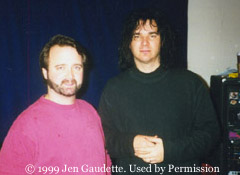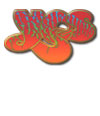
Conversation with
Billy Sherwood
from nfte #217
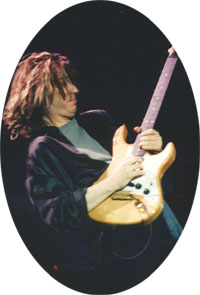
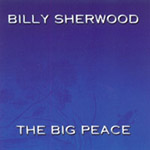
|
Paul Secord: On THE BIG PEACE...the first song "Lesson To Be Learned" starts with the line "some things are worth waiting for..." Tell me how long it took you to get this project out; I know it was a long time coming. Billy Sherwood: Yeah, well it was originally a project that was started as being the third World Trade album. What ended up happening was, I was quite busy producing and working with other people, and when I'd have down time to start working on the music in my studio, I would call around to see if anyone from World Trade was interested in hooking up. Schedules being what they were at the time, certain individuals were busy and couldn't come over, so I was by myself there with Jay Shelan pretty much, and so the two of us started hammering out songs thinking, "Well...ok we'll just carry on in the World Trade fashion here..." |
| "I was
really going for the jugular in terms of wanting to create a textured, layered spectrum of sound" |
Over the couple of years it actually took to make
that record, we found ourselves really with a different kind of project
without the other World Trade guys involved. We decided that the song "The
Call" which Bruce Gowdy played keyboards on, was going to work within the
project, and he did the keyboards on that, and we stuck that on there, so
there was a bit of World Trade flavor. But it started taking on a different
perspective-a different kind of World Trade album, even though in both of
our minds we thought, "Let's keep it a World Trade album."
At the time the record was finished I presented it to several companies and explained the story. They had suggested, "Well why don't you just make it a Billy Sherwood solo album?" At which point I had a conversation with Jay, and Jay thought it was a good idea since that was sort of how it evolved anyway out of a natural process, and that's how it kind of happened. So the lyric "some things are worth waiting for" in a way is kind of metaphorical to several different areas of the project. The main idea of the lyric was that you've waited through this long, nice intro and then the first lyric is kind of telling you that, it's hopefully going to be something you're going to enjoy. PS: I think a lot of people are. BS: Oh that's great. |
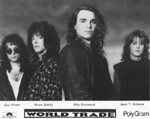
|
PS:
Do you think that there'll be another World Trade release, or do you think
that you'll continue to do more solo projects in the future?
BS: I'm constantly in touch with Bruce Gowdy, and we flirt around talking about it, but the realities of scheduling now with Yes being a bigger part of my life, like taking six months to complete THE LADDER up in Vancouver. When I get a chance to come home I find myself writing in different styles and different areas. To actually hook up and to do a project takes a bit of a commitment that I don't foresee having the time right now to do it. We always have it in the back of our minds, because we really enjoyed working together through those projects, and it would definitely be something we'd like to do, but schedules are a bit tight at the moment. PS: THE BIG PEACE is a very different album from the your earlier World Trade releases as you had said; different factors were involved-it's been compared to everything from Pink Floyd to Genesis. How do you feel about that comparison and what influences do you contributed to making this release different from some of your previous work? |
| "The lyric
'some things are worth waiting for' in a way is kind of metaphorical to several different areas of the project." |
BS: Well, I don't mind the comparisons because
people tend to hear what they hear in the music, and Pink Floyd has always
been one of my favorite groups, along with Genesis, Yes, UK, and [King]
Crimson, and all of those different styles and flavors, so naturally that's
going to kind of bleed thorough the music. I think that it's a good thing
because it shows that people are listening to it in a kind of different
light, like comparing it and they're finding their own thing within it;
I think it's a good thing.
PS: You've explored many different sounds on THE BIG PEACE—more than you have in the past. This is a very layered-sounding album, I think a lot of people have used that term. BS: Yeah, I think this particular album, I don't know if I could ever do another one like it. As I had said what it was was a matter of, "There's downtime in the studio tonight and there is no one working, and I'm finally getting my own studio that I've built to work on my own stuff." So it's just a matter of let's mess around with this effect and put it through that process, and I really did explore different techniques and sounds that I now use but I don't use in as excessive a fashion. But, at that point, I was really going for the jugular in terms of wanting to create a textured, layered spectrum of sound and different kind of instruments sounding not necessarily like the instrument that it was created on. |
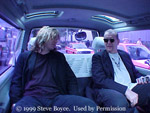
|
PS:
I think you've definitely achieved that; there are just so many things to
hear. You have to listen to the album many times just to catch some of the
things you do.
BS: Yeah that was one of the things that I wanted to do on it. Some people might think that's over-production or what have you, but I always dug those records where every time you listen to them, you say "wow, I've never noticed that"—trying to get that flavor definitely moving along in there. PS: As you've said, there's so many things that are going on, and you basically did this by yourself, except for Jay the drums, and a little bit from Bruce and Jimmy Haun. How do you go about doing all of this by yourself? BS: Well, I have this studio here [The Office], that I've had for years now. I have remotes for my tape machines set up all over the studio; one in the drum, one in the vocal room and one the control room. I set myself up depending on how I started writing the song, but usually it'll come through a guitar part or something that I'm thinking of in my head. I'll scratch something down on paper, and then go in and add some drums to just sketch out what I'm looking for, and start kind of building the picture up a little bit. Then once it's a bit more established, I call Jay and say, "OK, check this vibe out and here's the time signatures, and this part's moving. Can we now make this feel real and flow." |
| "that's
the vibe of the song— it's about this kind of letting go and just this peaceful place..." |
That's kind of the way that I do it, and I hop around
my studio I got pretty much have it set up on auto-pilot to always be able
to record anything I want. By doing that, I can think of something in my
head and lay it down at the time instantly: "OK, well, now it's needs a
little keyboard support here," jump on to my keyboard rack and it's plugged
in already. So by having things accessible quickly it keeps the creative
flow very, very fluid.
PS: So the technology is extending, not limiting your creativity? BS: No, I mean, I've set my room up basically to be able to just go. I think of what I'm recording as opposed to you think of something and say, "OK, let me patch that in and you plug this in, we'll get the keyboards." This way everything's always ready to go—it's on, red-alert basically, and that's what makes the creative flow for me personally so appealing at my place. I go into a major recording studio I have to go through the process of getting all of the patches the way that I want them, but at my place I just leave it the way I like it. PS: Are there other people, beside you, that are using the studio at the moment? BS: There's a producer named Bob Kulick and an engineer named Bruce Bouillet, who've pretty much moved in since I joined Yes, and they have been at my studio nonstop; to the point where now I can only go in on the weekends [laughs]. So I've created a little studio in my new house. Now I'm creating out of my house and when I need to go cut drums, I'll go to my studio on the weekends or something. But yeah, they've pretty much just taken over there. They're working on various projects for tribute records and new bands and doing all the mixing themselves. PS: And are they like booked pretty solid or are you looking to fill the schedule? BS: It's pretty much booked up over there. I was very surprised when I came back from Vancouver and I wanted to go in and do some writing. I went down there and looked at the schedule because I don't really deal with the schedule—I have someone else who does that and I said, "Can I have the weekend?" [laughs] |
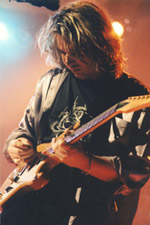
|
PS:
Yea, from midnight to six.
BS: You know, I created this monster that was built for my personal pleasure, and now it's turned into a bit of a business and so the business has taken over. Now I have to slide in time and see if I can get a good rate to get in my own place. PS: That's a good problem to have [laughs]. PS: The artwork for THE BIG PEACE is very cool, were you much involved with that? BS: The artist, who was commissioned by the record company, did a really, really good job with the texturing with the bluish kind of color. I thought for this one I just wanted to really just understate it and just put the title on it and add text and let the music do the speaking. PS: When you sit down to write a song, do you have a routine that you go through? Do you start with words or music? BS: It can happen in many, many different ways. Sometimes I'll hear a groove in my head, and that'll really be coming from a drum thing, so I'll go to my studio and sit down on my kit and record the drums, then start playing a guitar bit over the top of that, and then working the melody in. Sometimes, I'll just be sitting with an acoustic guitar and start strumming some stuff and singing some stuff over the top. Other times I'll be working with my synth just trying to get keyboard sounds up for a certain thing, and along the way stumbling into a sound and a particular chord progression that's intriguing, and starting that way. So I dabble around in a lot of different areas. I never really limit myself to one way to do it; but most of the time is coming from the guitar perspective. PS: So do you think most of the time the music comes first and the words follow? |
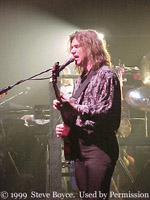
|
BS: Sometimes they do, yeah. In the case of
"The Big Peace", for example, that's definitely how it happened. All of
the music was coming together and when I had all the music down and I had
a vague idea of where I was going to put the melodies and how they were
going to work. But I really didn't chart out or have the song written before
I started the project. I was painting and painting until there was something
developing, and I thought "Ah, this painting is starting to look like something
interesting."
PS: It's a very complex piece, the title track, with lots of time changes and lots of interesting sounds. BS: Yea. Well, it's a funny thing, the actual title "The Big Peace". Every time Jay and I would get together we'd work on this monstrosity—it's like fifteen minutes long. The thing was I had my 24-track analog tape and I told Jay, "Look, I want to do an experiment where we put this analog tape on, I think we can record about fifteen minutes on there or something, let's just start, and keep tape going." And we filled this thing up, and we ended up with this thing, and along the way we kept saying, "Well, what do you want to work on today?" "Well, let's work on the big piece," which was the big piece of music...this concept. When the music was finally finished, Jay kept saying, "let's keep working on the big piece. I started thinking "well, maybe that's the vibe of the song—it's about this kind of letting go and just this peaceful place." It's kind of funny how that worked out; there's a perfect example of writing a song—how weird it can be and how it's comes about. PS: Do you have any favorite tracks on THE BIG PEACE? BS: I kind of enjoy the whole thing as-is. I liken it to seeing some sort of abstract film, where you really have to watch the whole thing, as opposed to jumping in and listening to just one song. I listen to the whole CD as one long song. PS: Oh that's interesting. Do you have any plans to do any shows or anything—get out there and play this material live? BS: Well, putting this together on the road would be no easy task, that's for sure, and it would require a serious amount of time and dedication, which, if I had any free time I would be willing to look into it. Now and it's June 11th and I'm gearing up to rehearse with Yes on July 19th. PS: Ok, yeah, as much as you would probably love to get out there... BS: I would love to do it, and I know that Jay would love to do it. I know a lot of great musicians to throw into the mix to make it happen, but really as I said it's the time and dedication and we just finished the new Yes album and now we're going to tour. |
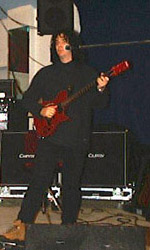
|
PS:
Well, talking a little bit about the new Yes project, THE LADDER, you mentioned
that it's completed the mastering process, so now it's gone to production
I imagine?
BS: Yep. PS: Tell us a little bit about how it was working with the rest of the guys in Yes on that. BS: A very cool process this time around
because we all lived in Vancouver, B.C. for six months, writing together
at a rehearsal place called The Sanctuary. We just basically came up with all kinds of different music, I mean, so many hours of music that by the time it came to sifting it all down, that was the real task. But in general, it was a very good experience because we all just fresh off of the OPEN YOUR EYES tour, and everybody was playing really well. Knowing the chemistry of how it was all working and how well it was working, we just took advantage of that and really had a great time up there. The spirit of the whole thing was very, very good. Having seen Yes from the outside for years, I don't know if it has been done quite like this in a long time. The whole band was actually in one room together working it out, hashing it out then coming up with conclusion that was worth all the time and effort. It was a very healthy process...it was really cool. |
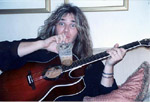
|
PS:
Did you bring any completed songs to the effort or was it all pretty much
a group thing?
BS: It ended up very much a group thing. Some of the ideas that I brought to the table were, in my mind, songs that I was thinking, "Well, I'll do this song outside of Yes." But I brought it in thinking, "You know I'd like to see what Yes would do with this?' In that process, it gets shifted and remolded and it turns into something different, but it still kind of has that germ of the initial idea, but it takes a radical change. So there were songs that I had brought in that were songs that I thought I would do outside of Yes, but ended up being better Yes songs. PS: Take us through the process of what you went through to get the album put together-what was a typical day like, either in the studio or in rehearsal. How did you approach your day? BS: Well, after stopping at Starbuck's for an Iced Venti Americano, it was straight off to the Sanctuary to do writing, pretty much from one o'clock until about seven every day. We would sit in there and write songs then grab a little bite to eat in the neighborhood that we were in, which was really nice there in Vancouver. And then for me, it was off to the casinos (Canada was very, very good!). That was the loop over and over and over until we started making the record and then one to seven just became working over at The Armory [Bruce Fairburn's Vancouver, B.C. studio] and being at my apartment watching endless Seinfeld reruns. PS: "...The importer-exporter" [Seinfeld reference] BS: That's right. [laughs] |
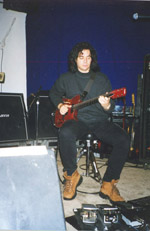
|
PS:
You've been a producer for a long time—you've produced a lot of different
bands. What was it like relinquishing that role this time, and allowing
Bruce to take over, and how did you like working in that situation?
BS: Well, for me personally, yielding it to Bruce was the best thing I think because he was an amazing producer. Unfortunately he passed away in the mixing stage of the record, which is a real tragedy. He was an amazing producer and amazing diplomat, in terms of dealing with Yes—six people sitting in a room—everybody needing their own ideas. So I was actually looking at it as a learning experience because this was a guy who sold many albums and made so many great albums, that handing it over to a guy like that was not really much of a handing over, it's more like, "Will you please show me something I don't know?" So that's kind of the attitude that I had going into it. He worked extremely well with everyone, and I think his contribution to the album is very whole because he lived through the whole making of the album—he passed away during the mixing of it, but I think his stamp is well on the album, and it was a good thing that he was there. |
| "Well,
for me personally, yield- ing it to Bruce was the best thing I think because he was an amazing producer." |
Yeah, I mean, I really thought "Well wow, here's the
guy who pretty much without asking...it would be obvious to do another album
with this guy," you know what I mean? He really got along great with everybody
and had great musical ideas and was pretty much the guy who would put his
foot down when you needed someone to put his foot down. Even if I didn't
agree with him 100% of the time, I respected the fact that he believed in
what he did, so it was like, "Well, you're probably right about this, let's
go with it," and it's a shame that he passed away.
PS: You had mentioned that there was a lot of new Yes material and part of the process was sifting through some of it. Is there enough material for another release? BS: I don't know if it's that deep because when we recorded this stuff that I'm talking about, it was really on a little funky stereo microphone to a mini-disc in a room. It's very, very rough on that level, but you know, the idea will always remain, and you never know on the next record we might listen back and go "wow, I forgot about that—that didn't make it because of x or y then but maybe it can work now because of z." |

|
PS:
Looking back to some of your early work, there is still a lot of interest
in the first two World Trade releases, in The Key project you did with Marty
Walsh and even your first band, Lodgic. Do you have any plans ever to re-release
any of that material?
BS: Well, the first World Trade album is a probably more of a legal issue. They [the record company] can do what they want. Unfortunately I don't think they're running out in a desperate desire to reprint that record although I know that there are a lot of people out there who would like to hear it and have heard about it. As far as Euphoria goes, I'm sure Magna Carta will keep it available for purchase. In terms of the Lodgic album, is that what you were asking about? PS: Yeah, NOMADIC SANDS. BS: Yeah, that record I doubt would be re-released because it's another one of those scenarios except that the record company is A&M. So when you get into those kinds of things, unfortunately you've sold your soul if you will, and they can pretty much say "thank you, here it is up on the shelf and that's where we're keeping it." So, unless Yes just goes through the moon and sells a zillion units, maybe then they'll have a desire to do it. PS: I think your being in Yes has definitely generated a lot of interest in some of your earlier work. BS: Yeah, well I know that the Lodgic album is an interesting album. They're all interesting and unique in their own way and for Yes fans they would be able to retrace my history, it would be pretty cool. Obviously on all of those records you hear my Yes influences-it's what people used to tell me, "You sound too much like that [Yes]"; obviously it's panned out [laughs]. |
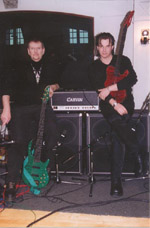
|
PS:
What about THE WORLD IS WATCHING by The Key, is that the kind of same situation?
BS: That is an interesting story because The Key project that is actually released with Marty Walsh is a different version than The Key project [DELTA SIERRA JULIET] that was made with myself, Jimmy Haun, and Mark Williams from World Trade. That was one project that was made and put on the shelf, as what I was just explaining. Unfortunately I don't know if you would be able to manipulate that one from the shelf and it's too bad because it was really, really cool. PS: Speaking of Lodgic, you recently worked with your brother Michael for the first time in a long time on his TANGLETOWN project. How did that come about? BS: Well, I happened to be home on a bit of a break in the last tour when we were on the road, and I hadn't seen Mike in a while. It was one of those things where like, "Where are you?" "I'm at the studio." "Well I'm coming over." So I went over and they were about to dive into backgrounds, and I was just standing there and Mike said "hey man why don't you sing on this thing?" So I jumped out there and had a great time. I like that record a lot—it's a really kind of cool mixture of sounds and colors and stuff; it's a very good record, sort of like XTC meets Dave Matthews. It's very cool. PS: Is that the first time you've worked together since Lodgic? BS: Yeah, pretty much, we've written songs together that haven't been published. We don't get together and work together as much as we both would like to because he busy doing his thing and I'm busy doing my thing-both are in the pursuit of music, but both are so engaging that it's very difficult to find free time outside of it. |
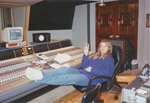
|
PS:
What's coming up for you now? You've mentioned the tour for THE LADDER is
coming up at the end of the summer. Is that going to be an extended tour
like the last one?
BS: Well, I think so, I mean, there's nothing set in stone, but when we started touring last year we started with the intention of we'll do a couple of months and we'd see what happened, and it ended up being a year. PS: Right, you were touring forever. BS: So, I'm thinking that the same pattern will probably emerge again, if not, extended because this record might very well put us up—kick us up to different platform as well. PS: Are those your only plans for now? BS: That's pretty much it; I'm just actually enjoying being home and kind of kicking around and doing a little gardening here and there and messing around in my studio with some songs. Knowing that I've just finished working six months with Yes, I'm taking this time to totally just try to relax myself, because I know that we're about to gear up and go again. Before I was in the band I'd I'd have the feeling that I had to be doing something every day because I was working and producing. Being in Yes is a real commitment—that was a half-year of work, I need a month off [laughs]. PS: It's a different routine. BS: It's a different routine, and I know that often you don't get time off around Yes. So when you do, it becomes golden, I'm not complaining; I love doing it that's for sure. PS: But, there's also a time to spend with your family and just relax. BS: Yeah, I mean you gotta do that. PS: Thanks for your time, Billy. Congratulations on THE BIG PEACE. We're all looking forward to hearing THE LADDER and seeing Yes out on the road this fall. BS: Thanks. |
